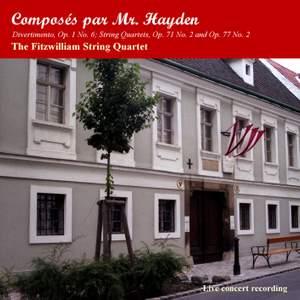On March 2nd 1969 the Fitzwilliam String Quartet made its first ever public appearance – for Fitzwilliam College Music Society in Cambridge (hence its name). By a happy coincidence the forty-year milestone for the FSQ also coincided with the 200th anniversary of arguably the greatest of all composers for string quartet, Franz Joseph Haydn (1732–1809). This man’s reputation has for too long suffered beyond the horizons he himself broadened; his achievements have too often been eclipsed by those of his successors. It was only natural that, as one of the great innovators, he should create not just a magnificent treasury of music himself but also limitless possibilities on which others might build. While he may never equal the popular appeal of his young friend Mozart, 2009 went some considerable way towards reminding us of his towering presence in our musical history and heritage. The music speaks for itself, but the mission of the performers must be the responsibility of presenting it in the best possible light.
The Fitzwilliam Quartet were heavily involved with Haydn during his anniversary year, but the present performances were recorded many years earlier, at a public concert on 1st February 2001 at Royal Holloway College. At that time the quartet’s personnel was in transition, but happily this recording captures Jonathan Cohen’s brief sojourn as cellist. Period instruments were used, and there were no retakes or edits at all. The selection of works literally spans the beginning and end of Haydn’s career as a quartet composer, from his earliest set of Divertimenti a quattro to what might be considered one of the greatest string quartets of all time, and framing one of the first quartets ever written specifically for public performance.
Founded in 1968 by four Cambridge undergraduates, the Fitzwilliam Quartet first became well known through its close personal association with Dmitri Shostakovich, who befriended them following a visit to York to hear them play. He entrusted them with the Western premières of his last three quartets, and before long they had become the first ever group to perform and record all fifteen. These recordings, which gained many international awards, secured for them a world wide concert schedule, and a long term contract with Decca/London which embraced some byways of late Romantic repertoire (including Franck, Delius, Borodin, and Sibelius) before they embarked on a Beethoven cycle. Indeed, the Shostakovich set was included in Gramophone magazine’s “Hundred Greatest-ever Recordings” in November 2005.





